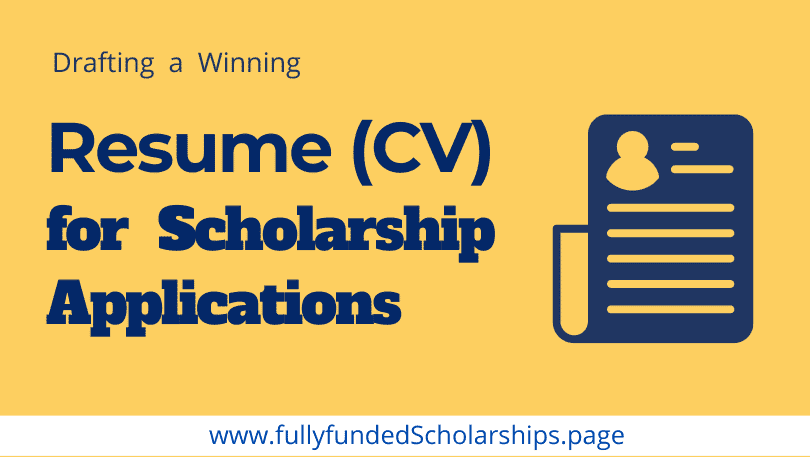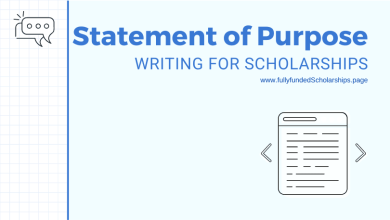
Resume (CV) for Scholarship Applications – Writing an academic CV for a scholarship can seem daunting, but it doesn’t have to be! In this blog post, we’ll provide some tips and advice on how to put together a strong, comprehensive academic CV that will help you stand out from the crowd. We’ll discuss what to include, how to present your information, and how to make sure your CV will give you the best chance of success. Read on to find out more!
❖ The Basics of an Academic CV:
An academic CV is an important document for potential scholarship and college applications. It provides a detailed summary of your academic accomplishments, including your degrees, awards, publications, research, internships, and more. An academic CV is the most comprehensive way to present yourself to a selection committee, so it’s important to make sure that you include all of the relevant information in an organized, professional format.
When preparing an academic CV, it is important to remember that you should keep it concise and direct. Your academic CV should be no longer than two pages, with each entry providing a clear description of what you have done. Additionally, make sure that you use language that is easy to understand and avoid jargon and technical terms.
❖ Tailoring Your Academic CV for a Scholarship:
When applying for a scholarship, it is important to tailor your academic CV to the program you are applying for. Here are some tips for tailoring your academic CV for a scholarship:
1# Highlight Relevant Experience:
Your academic CV should showcase any relevant experiences or qualifications you have related to the scholarship. This may include coursework, extracurricular activities, awards, and certifications. Make sure to list these experiences in order of importance and relevance to the scholarship.
2# Use Keywords:
Look at the scholarship application page and any other information they provide about the program. Look for keywords such as “leadership,” “community service,” or “innovative thinking” and incorporate those into your academic CV.
3# Focus on Your Accomplishments:
Your academic CV should focus on accomplishments rather than simply describing what you did in each role or class. Include concrete numbers and metrics wherever possible that demonstrate your success and the impact you have had.
4# Keep It Concise:
Your academic CV should be concise and focused. Avoid long-winded sentences and stick to the facts that are most relevant to the scholarship.
Following these tips will help ensure your academic CV is tailored to the scholarship you are applying for and stands out from other applications. Presenting yourself in the best light possible will give you a better chance of being awarded the scholarship.
What to Include In an Academic Resume (CV)?
An Academic CV must include these things:
★ Personal Details:
Start your academic CV by providing your personal information, such as name, address, telephone number, and email address.
★ Education:
Provide a list of your educational qualifications, including the name of the institution and the degree/award you received. Make sure to list any academic distinctions or honors that you have achieved during your studies.
★ Work Experience:
Outline any relevant work experience that you may have had in the past, including volunteer work, internships, and full-time employment.
★ Publications & Presentations:
Include any publications or presentations that you have made in an academic setting, such as journal articles or conference proceedings.
★ Professional Memberships & Awards:
List any memberships in professional organizations and any awards or honors that you have received for your academic work.
★ Research Interests & Skills:
Provide an overview of your research interests and any skills that you have developed as a result of your studies. This could include laboratory techniques, data analysis software, or any other specialized knowledge.
★ References:
Lastly, include contact information for two to three references who can provide additional information about your academic background.
Tips For Writing an Academic CV:
While Writing an Academic CV these tips will be beneficial for you:
★ Use an Organized and Easy to Read Layout:
When creating your academic CV, it’s important to use an organized, clean layout that is easy to read. Use concise headings and a clear font to make the information easy to find and read.
★ Include Relevant Information:
The key to writing an effective academic CV is to include only the most relevant information. Make sure to include all of your education and research experience, as well as any awards or honors you have received.
★ Highlight Important Achievements:
When highlighting important achievements, be sure to include awards or recognitions that you have received or papers that you have published. This will demonstrate your commitment to your field and make you stand out from the crowd.
★ Be Honest:
It’s important to be honest when writing your academic resume (CV). Don’t try to embellish or exaggerate your credentials; instead, focus on highlighting your true accomplishments.
★ Proofread:
Before submitting your academic CV, be sure to proofread it for spelling and grammatical errors. A well-written CV can make all the difference in getting a scholarship or job offer.










